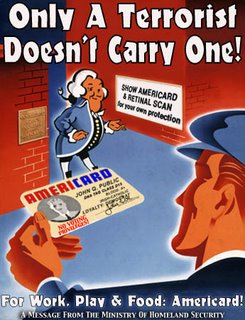They Buried the Lead!
 A common mistake by wet-behind-the-ears reporters is burying the lead, or putting the most important fact(s) anywhere but at the head of the story. That's how I see the following segment from a CNET News.com story about embedding information chips in state-issued driver's licenses:
A common mistake by wet-behind-the-ears reporters is burying the lead, or putting the most important fact(s) anywhere but at the head of the story. That's how I see the following segment from a CNET News.com story about embedding information chips in state-issued driver's licenses:
... national ID card may soon find itself used for other purposes than verifying credentials of Americans, the panelists warned.It is not likely that anyone reading this blog remembers a time when your Social Security number (SSN) had just one purpose: redeeming your government benefits. Since then it has suffered from "function creep" and has almost become a form of national identity marker. Countless times a day I have to enter the last four or five digits of my SSN into a piece of hardware or bit of software to identify myself as an authorized user. And customers that want to do certain things with their accounts have to recite the last four of their SSN to me for access (Disclaimer: I work for Cingular Wireless). The reason I know they gave the right information to me is that I see their whole Social Security number.
The issue of "function creep" could arise, much like it has with the use of driver's licenses, said Paul Kocher, president and chief scientist of Cryptography Research. He noted that driver's licenses are used for more than just verifying the ability of a person to drive a car--they're also used as a form of ID when writing a check and as a way to verify that a person is old enough to drink alcohol ("Driver's licence or national ID card?" February 16, 2006, 2:04 PM PST).
Allocating more functions to the SSN has made it more vulnerable to criminals who which to use it fraudulently. Some of the 9/11 hijackers had driver's licenses. You need to show an SSN to get one of those. Consider that carefully enough and you'll become a bit paranoid at the thought of giving out your information. Unfortunately, the people involved with turning our driver's licenses into national ID cards are not nearly paranoid enough.
For your consideration:
ID cards in the UK (click here)
A CNN report from 2001 (click here)
A Christian Science Monitor report from 2002 (click here)
The CATO Institute's take on the issue (click here)
FAQs from Computer Professionals for Social Responsibility (click here)
Another great report from CNET News (click here)
